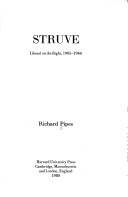Russian Research Centre Study
1 primary work • 3 total works
Book 13
After 1905--the years covered in this self-contained volume--Struve became the principal critic of the Russian intelligentsia and the main political ideologist of the anti-Bolshevik opposition during the Civil War and in emigration. His life was a part of the life of Russia as he struggled to craft a liberal democracy and wound up defeated and faced with an emerging totalitarian state.
In writing about Struve, Richard Pipes turns biography into history. He lays bare the split soul of the Russian intellectuals--their irresponsibility, unwillingness to compromise, intolerance. Struve, the liberal turned conservative, preached to his countrymen physical and spiritual freedom based on law. He was a Westerner in his championing of social reform, legality, private property, and a vigorous state and foreign policy. This long and rich tradition of liberal-conservatism is recounted against the background of a "monstrous growth of political claims on the individual that caused intellectual and moral independence increasingly to be punished with ostracism, confinement, exile, and death."


